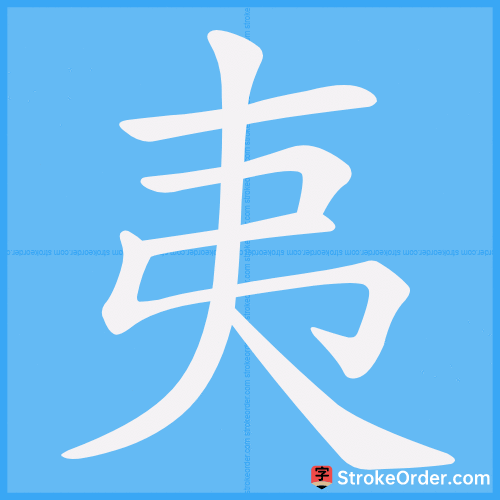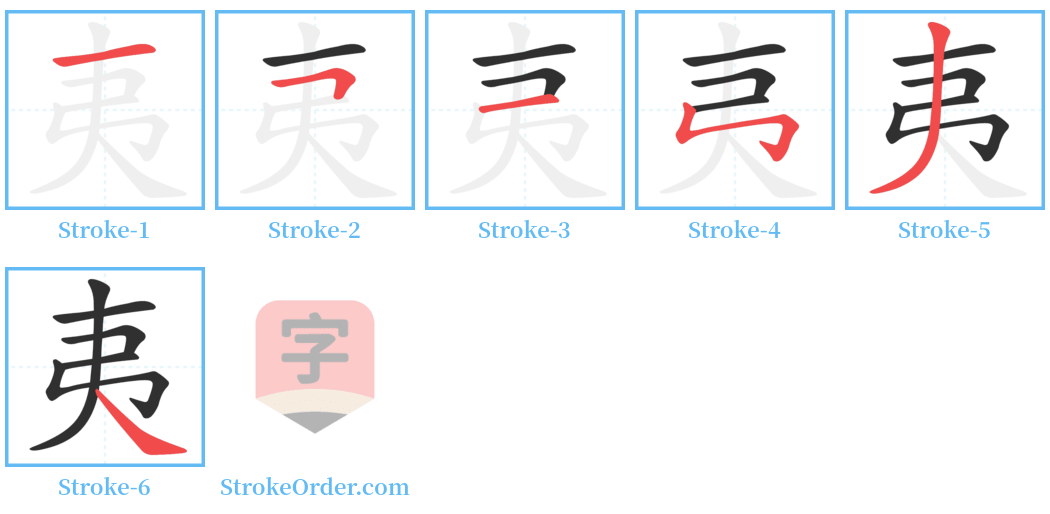夷 Stroke Order
Animated Stroke Order of 夷

Stroke Order Diagrams for 夷

Step-by-Step Handwriting Guide for 夷

Learn to Write Chinese Characters with Video Tutorials
Watch the video of writing the Chinese character "夷", learn the correct stroke order (笔顺) of the character "夷", and master the standard way of writing the character "夷".
Free Printable Handwriting Practice with Stroke Order: 夷
Printable Writing Practice Worksheet of "夷" in Portrait Orientation (Tian Zi Ge)

Printable Writing Practice Worksheet of "夷" in Landscape Orientation (Tian Zi Ge)

Information of 夷
Pinyin
yí
Radical
大
Strokes
6 strokes
Usage
★★★★★
Definition
a barbarian
夷 [yí]
名
1. 中国古代称东部的民族:东夷。九夷(古时称东夷有九种)。
[En.] In ancient China, it referred to the ethnic groups located to the east; Dongyi. There are nine Yi (historically known as the nine types of Dongyi).
2. 中国旧时指外国或外国的:华夷杂处(chǔ)。
[En.] In ancient times, it was often used to refer to foreign countries or people; "Hua Yi mixed together."
3. 倚辈;同辈。
[En.] Same kind; peers.
4. 古国名:Yi state。在今山东省即墨市西。
[En.] Name of an ancient state: Yi state, located west of the current Jimo City in Shandong Province.
5. 姓。
[En.] A surname.
形
1. 平坦。
[En.] Level; flat.
2. 太平。
[En.] Peaceful.
3. 平和;平易。
[En.] Gentle; modest.
4. 平正。
[En.] Flat; level.
5. 经常,常道。
[En.] Usual; routine.
6. 傲慢。
[En.] Arrogant.
7. 安闲。
[En.] Leisurely.
8. 通“怡”,喜悦。
[En.] Happy; joyful.
动
1. 使平,拉平;铲平。
[En.] Level to the ground; flatten.
2. 伤,受伤。
[En.] To be wounded.
3. 攻破。
[En.] Capture.
4. 铲除;消灭;诛灭。
[En.] Exterminate; put to death.
5. 毁灭。
[En.] Ruin.
6. 犹豫,迟疑。
[En.] Hesitate.
7. 锄草。
[En.] Root out.
Yiling (barbarian mound), historical place name in Yichang county 宜昌縣|宜昌县 Hubei, first mentioned in history (after its destruction by Qin) as burial place of the former Chu kings / Yiling district of Yichang city 宜昌市[Yi2 chang1 shi4], Hubei
Mt Wuyi in Fujian / Wuyishan nature reserve / Wuyishan county level city in Nanping 南平[Nan2 ping2] Fujian
to use foreigners to subdue foreigners (idiom); let the barbarians fight it out among themselves (traditional policy of successive dynasties) / Use Western science and technology to counter imperialist encroachment. (late Qing modernizing slogan)
lit. to make one's way through a dangerous pass as if walking on level ground (idiom) / fig. to handle a crisis effortlessly
Input Method for 夷
Pinyin
yi2
Wubi
gxwi
Cangjie
kn
Zhengma
gdyz
Four Corner
50802
Unicode
U+5937
Same Pronunciation Characters